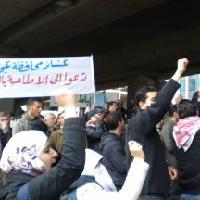
Regime ‘reforms’ fail to stop growing demonstrations
On Friday 26 March, more than 1,500 demonstrators demanding reforms clashed with a group of government supporters in the centre of Amman, throwing stones at each other until police forces charged in and started beating protesters with batons. One person was killed and more than 100 injured. Islamic Action Front leader, Hamza Mansour, said his party member and anti-government protester, Khairi Jamil Saeed, was "killed as a result of brutal police beating on his head and body." (AP, 25 March).
This is the most violent event that has taken place, so far, in Jordan, over the last few weeks of demonstrations. Until now, demonstrations have been relatively small and peaceful in Jordan, in comparison to those in other Arab countries, and have not been calling for the removal of King Abdullah II. Now protesters say they will intensify their struggle and they are determined to take it much further, until their demands are met by the government.
The campaign was launched on Thursday 24 March, as a peaceful sit-in protest at the Interior Ministry Circle in the centre of Amman, by a group of young people under the banner, ‘March 24th Movement’ and was mostly coordinated through Facebook. The movement was organized by university students and young workers inspired by the Egyptian, Tunisian and Libyan revolutions. Their demands are for political reforms and better living and working conditions. They call for an end to corruption and autocracy, as well as the removal of Prime Minister Bakhit. Their slogans are about freedom of expression, freedom of political expression in universities and for democracy. They demand the dismantling of the feared ‘Intelligence’ (secret police).
Regime ‘reforms’
‘We are not here to play. We want the government to take the message and make changes now, otherwise we are not leaving’ one of the protesters said. ‘People are very angry and determined to stay here until the end,’ a young worker said, adding that what people are asking for is immediate change and no more promises. ‘There is no trust to anyone in this government. We want to be able to have a word about who is representing us, we ask for a real vote’, one young unemployed said. The most popular slogan, so far, is: ‘Grandfather was a Palestine martyr, Father was Al-Karama martyr, Brother is a duty martyr, I am a liberty and corruption martyr’
A few days ago, King Abdullah II and Prime Minister Bakhit publicly pledged for new reform policies as a sign of good will towards the uprisings. The key points of those reforms include a call for the elimination of corruption; an end to interference in students’ unions and for freedom of political beliefs at universities, to take practical steps within three months to revive the economy and create jobs; to ensure social justice; to put in place measures to attract foreign investments, especially from Arab countries, and for judicial independence.
No matter what reforms the government gives because of fear of more uprisings, the majority of Jordanians have no trust in this government whatsoever and are fully determined to fight until they see real changes. The fact that this movement has been initiated by young people who are angry and fed up with this repressive ruling elite, is a sign of a genuine movement that could develop similar to what we have seen in Tunisia and Egypt.
It is necessary to translate the growing desire for change among youth into demands for fundamental change that challenge the regime.
We call for:
- Unity of the working masses against the ruling elite and state repression
- End corruption
- For the dismantling of the secret police forces
- For a programme that represents an alternative for workers and the poor, to build a mass movement against sectarian politics and impoverishing economic policies
- For immediate elections to a constituent assembly! For a majority workers and small farmers’ government, with socialist policies
- A living minimum wage and affordable food and other essential goods and housing. For massive investment in the public sector, including education, health care, social security and pensions
- End unemployment; jobs for all
- The building of a workers’ movement to unite the working class and fight for the eradication of poverty, sectarianism and racism
- Struggle for a real alternative society; for genuine democratic socialism


Be the first to comment